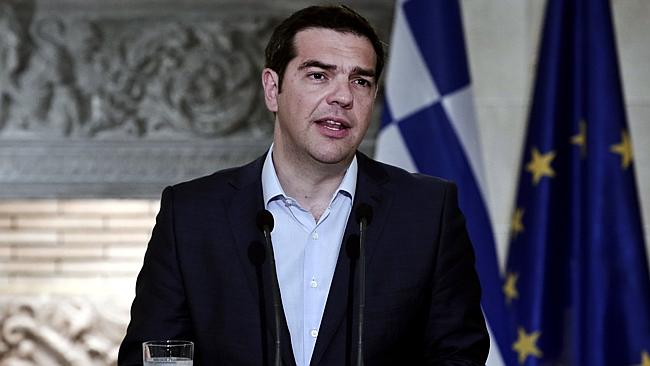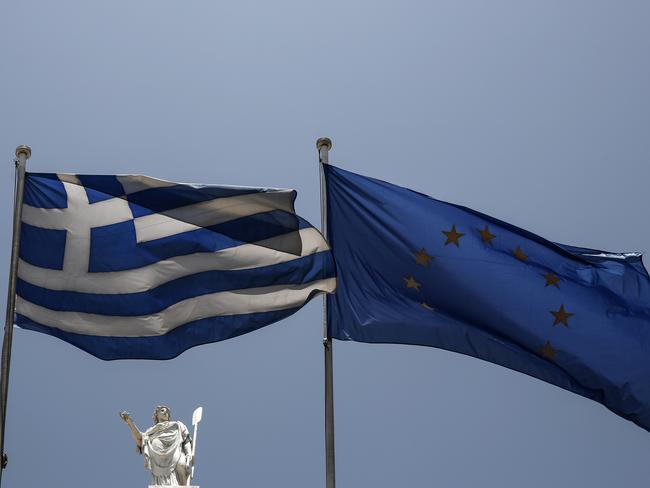Greeks stashing money in homes as deadline looms for debt repayments
THESE people are withdrawing millions each day and stuffing the money in their homes, with an ‘uncontrollable crisis’ set to hit.

ORDINARY Greeks are stashing millions of dollars in cash in their homes and garages amid dire warnings of an “uncontrollable crisis” if debt negotiations fail to reach an agreement.
Today the Eurozone’s 19 finance ministers will meet in Luxembourg to discuss details of the Greek bailout which is currently deadlocked.
It comes as the amount of money withdrawn from ATMs in the cash-strapped country has averaged around $300 million a day in recent weeks, peaking to more than $580 million on Monday amid renewed fears Greece would be forced into a default.
University researcher Joanna Christofosaki told The Guardian she knew people with up to $15,000 stashed at home.
“Our friends have all done it. Nobody wants their money to be worthless tomorrow. Nobody wants to be unable to get at it,” she said.
The country’s central bank has also warned deposits fell by $44 billion between December and April and failing to reach an agreement would “mark the beginning of a painful course” for the country.
As negotiations come down to the wire in Greece, here’s what you need to know.
CRUNCH TIME, AGAIN
It’s been crunch time a lot lately for Greece but this really is the big one. At the moment the country is locked in negotiations over the release of $10.5 billion (€7.2 billion) in rescue funds provided by its creditors; the International Monetary Fund, European Union, European Central Bank — known as the troika — until the two sides can agree on terms.
The problem is, Greece needs $2.64 billion (€1.5 billion euros) of this money to pay back a debt to the IMF by the end of June. If it doesn’t get released, they will default on the payment which could lead to them getting booted out of the 19-member euro.
In recent weeks the relationship has turned sour with Greek Prime Minister Alexis Tsipras saying the IMF had “criminal responsibility” for the dire state Greece is in.
Spreader financial analyst Connor Campbell told AFP today’s meeting was supposed to be about finessing the finer points of the deal.
“Instead, each side is ramping up the finger-pointing rhetoric seemingly in preparation for the worst-case scenario,” he said.

‘UNCONTROLLABLE CRISIS’
To add to the tension, the Bank of Greece released a report on Wednesday warning that leaving the euro would be a disaster for an economy already 25 per cent smaller than it was in 2008 and with one in four people unemployed.
“Failure to reach an agreement would, on the contrary, mark the beginning of a painful course that would lead initially to a Greek default and ultimately to the country’s exit from the euro area and — most likely — from the European Union,” it read.
“A manageable debt crisis, as the one that we are currently addressing with the help of our partners, would snowball into an uncontrollable crisis, with great risks for the banking system and financial stability.
“All this would imply deep recession, a dramatic decline in income levels, an exponential rise in unemployment and a collapse of all that the Greek economy has achieved over the years of its EU, and especially its euro area, membership.”
Ouch. That’s not to mention the can of worms a Grexit would mean for today’s “globally integrated financial markets” as US Treasury Secretary Jacob Lew told the US House of Representatives.
It could also mean other countries like Spain, Italy and Portugal start considering their options and ultimately lead to a huge unrest and political upheaval in Greece and throughout the European Union.
‘JUMPING TO CONCLUSIONS’
Despite the dire outlook, Eurogroup chairman Jeroen Dijsselbloem said a Grexit is not inevitable and talk may be premature.
“My intention remains to keep Greece within the eurozone,” he said. “We are all jumping to conclusions and that we should not do.”
However European officials and the UK treasury have already been making contingency plans, with talk of ‘capital controls’ such as a restriction on bank withdrawals and credit card transactions being put in place designed to lock down the cash that is already in the country.
If Greece doesn’t meet the terms, it will be uncharted territory and the country may return to the drachma.
The next crucial date to watch for is 30 June when the deadline for payment is due.



